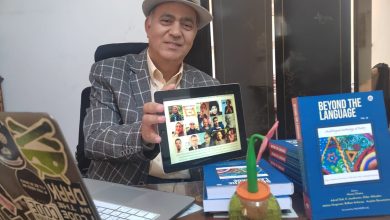A man who resembles me (Short Story) by Sherif Abd ElMegid
Translated into Arabic by Dr.Salwa Gouda

Sherif Abd ElMegid
Sherif Abd ElMegid is an author who has published eight short story collections: “A New Segment of an Old Legend” (2002), “After-Sales Services” (2006), “Time Difference,” “A Perfect Crime,” “White Taxi,” “Solo Al-Khalifa,” “The Last Biblomaniac,” and “The Old Coin Collector,” along with a play titled “Possibilities” and a children’s story “Maryam’s Doves.” He received the Sawiris Award for Best Short Story Collection in 2008, won the Best Illustrated Art Book Award in 2012 for “Land, Land,” and his collection “Solo Al-Khalifa” was shortlisted for the 2020 Sawiris Award for Senior Writers. Some of his works have been translated into English and French.
Translated into Arabic by Dr.Salwa Gouda
Dr Salwa Gouda is an accomplished Egyptian literary translator, critic, and academic affiliated with the English Language and Literature Department at Ain Shams University. Holding a PhD in English literature and criticism, Dr. Gouda pursued her education at both Ain Shams University and California State University, San Bernardino. She has authored several academic works, including Lectures in English Poetry and Introduction to Modern Literary Criticism, among others. Dr. Gouda also played a significant role in translating The Arab Encyclopedia for Pioneers, a comprehensive project featuring poets, philosophers, historians, and literary figures, conducted under the auspices of UNESCO. Recently, her poetry translations have been featured in a poetry anthology published by Alien Buddha Press in Arizona, USA. Her work has also appeared in numerous international literary magazines, further solidifying her contributions to the field of literary translation and criticism.
Short story
A man who resembles me
Every time I enter the elevator, exactly at seven-thirty in the morning, I find him with me. At first, we didn’t greet each other, but as time passed, we began exchanging smiles. After years of getting to know each other better, we started sharing jokes, especially when my daughter and his daughter ride the school bus together, and when he can’t pay the school bus fee, he first goes to school to drop off his daughter, then we both take a minivan to the subway line near the school, before each of us heads to work. Sometimes, on my way back from work on the subway, I find him sitting next to me, laughing at me amidst the crowd, and sometimes he looks as gloomy as an old man who has reached the decrepit stage of life and is waiting for death.
We met at various social events, at homeowners’ association meetings, and sat in coffee shops, each cheering for the national team and dreaming of its ascent to the World Cup. I used to enjoy walking a little along the Nile Corniche, especially on winter mornings during holidays, and I would find him exercising next to me. We would engage in long conversations about life, people, difficult circumstances, and global changes. We even brainstormed scientific inventions that could make human life easier because they were affordable.
We went together to the Friday market, the popular market known to all animal lovers. We haggled over the prices of dogs and cats that we would never buy due to their high cost and the lack of space in our cramped apartments for an animal or even a new piece of furniture.
I found him sitting in the simple café downtown, the same café I frequent. I wondered: Do people of the same class do the same things? Is his salary similar to mine? Does he participate in savings groups with his colleagues to meet his family’s needs? Did he dream, like me, of reaching senior management in his job and fail? Does he have plans to develop his organization, but no one listens to him, just like me? Is he afraid of dying before his children are educated? Does he share my fear of heights?
I noticed that he, exactly like me, lights a new cigarette from the one before it goes out. He takes the second-to-last puff, looks at his cigarette, and pulls out a fresh one from his pack. He places the new one in his mouth and lights it from the old one. I see him talking to himself, getting heated in discussions with his own ghosts.
I pull up a chair and sit across from him in the café. We laugh together at the wars and destruction happening around us, telling explicit jokes and jokes about the constant price hikes.
Once, we decided to go to a cinema in a large mall. We sat at a Costa Coffee, drank cappuccinos, and paid an exorbitant amount—the most we had ever paid for a cup of coffee in our lives. He was so angry about the inflated price that he didn’t even drink his cappuccino.
We entered the cinema, where tickets cost sixty Egyptian pounds. I told him that I had gone to the cinema in 1981 when I was ten years old for ten piasters. We laughed so loudly that the cinema management decided to kick us out.
I complained to him about my diabetes, which had worsened recently and caused my sexual weakness—a secret I had never revealed to anyone, not even my siblings. I told him how my wife had grown tired and started forgetting my insulin injection times, so I learned to inject myself. It became one of the things I must never forget, like my watch, phone, and wallet. He was astonished because he does exactly the same thing.
He, in turn, confided in me about several of his serious secrets. He had sold his share of his family’s house in his village to cover the expenses for his eldest daughter’s wedding. As he grew older, he began to dislike new cities and preferred the suburbs. He had dreamed of living in Maadi, where his father worked as a driver for a large company. His father would describe the streets to him, and as he grew older, his father took him along on some workdays. He fell in love with Maadi, its beautiful gardens, well-organized streets, and the flower shops scattered around. He became resentful of the Basateen area, where he was born, raised, and grew up—especially the view of the cemeteries in the Al-Agzakhana area where he lived. He worked in the Gulf for five consecutive years with almost no vacations until he could buy the apartment in the building where we now became neighbors.
I never met his family or encountered them in the elevator, but I discovered that he, like me, reads psychology. During one of our discussions about strange diseases, we stumbled upon Cotard’s delusion, one of the strangest psychological disorders. The symptoms of this disease, called Walking Corpse Syndrome, develop through three main stages. In the first stage, the patient suffers from depression and obsessions. In the second stage, they feel as if they have died and do not exist at all, or they imagine losing parts of their body. The final stage is when the patient enters severe depression, suffers greatly from obsessions, and experiences intense delusions.
Last Friday, I overslept and missed the Friday prayer. I decided to go down for the Dhuhr prayer at the mosque—I hadn’t missed Friday prayers in many years. When I returned from the mosque, I found a note posted on the elevator door mourning my dear neighbor. I decided to go up to my apartment, opened the door, entered, ironed my clothes, and had lunch.
When I heard the mosque imam reciting the Quran, I decided to go down to offer my condolences to the deceased’s family at the entrance of the building.
I reached the condolence gathering. No one returned my greeting. My only aim was to say, “May God grant you patience.” None of them stood up when I entered. I found all my family members present at the front, receiving condolences. No one spoke to me or saw me. Even when I sat among the mourners, no one looked my way. I thought again about the name written on the elevator door—it was my name. This puzzled me: Why didn’t they speak to me? They thought I was dead, while the one who died was merely a man who resembles me!

 Dr Salwa Gouda is an accomplished Egyptian literary translator, critic, and academic affiliated with the English Language and Literature Department at Ain Shams University. Holding a PhD in English literature and criticism, Dr. Gouda pursued her education at both Ain Shams University and California State University, San Bernardino. She has authored several academic works, including Lectures in English Poetry and Introduction to Modern Literary Criticism, among others. Dr. Gouda also played a significant role in translating The Arab Encyclopedia for Pioneers, a comprehensive project featuring poets, philosophers, historians, and literary figures, conducted under the auspices of UNESCO. Recently, her poetry translations have been featured in a poetry anthology published by Alien Buddha Press in Arizona, USA. Her work has also appeared in numerous international literary magazines, further solidifying her contributions to the field of literary translation and criticism.
Dr Salwa Gouda is an accomplished Egyptian literary translator, critic, and academic affiliated with the English Language and Literature Department at Ain Shams University. Holding a PhD in English literature and criticism, Dr. Gouda pursued her education at both Ain Shams University and California State University, San Bernardino. She has authored several academic works, including Lectures in English Poetry and Introduction to Modern Literary Criticism, among others. Dr. Gouda also played a significant role in translating The Arab Encyclopedia for Pioneers, a comprehensive project featuring poets, philosophers, historians, and literary figures, conducted under the auspices of UNESCO. Recently, her poetry translations have been featured in a poetry anthology published by Alien Buddha Press in Arizona, USA. Her work has also appeared in numerous international literary magazines, further solidifying her contributions to the field of literary translation and criticism.


